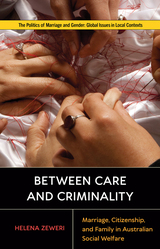Earning More and Getting Less: Why Successful Wives Can't Buy Equality
Rutgers University Press, 2005
Cloth: 978-0-8135-3678-1 | Paper: 978-0-8135-3679-8 | eISBN: 978-0-8135-7859-0 (ePub) | eISBN: 978-0-8135-3788-7 (PDF)
Library of Congress Classification HQ734.T526 2005
Dewey Decimal Classification 306.81
Cloth: 978-0-8135-3678-1 | Paper: 978-0-8135-3679-8 | eISBN: 978-0-8135-7859-0 (ePub) | eISBN: 978-0-8135-3788-7 (PDF)
Library of Congress Classification HQ734.T526 2005
Dewey Decimal Classification 306.81
ABOUT THIS BOOK | AUTHOR BIOGRAPHY | REVIEWS | TOC
ABOUT THIS BOOK
For nearly two decades the wage gap between men and women has remained virtually unchanged. Women continue to earn, on average, 80 cents for every dollar that men earn. Yet despite persistent discrimination in wages, studies are also beginning to show that a growing number of women are out-earning their husbands. Nationwide, nearly one-third of working women are the chief breadwinners in their families. The trend is particularly pronounced among the demographic of highly educated women. Does this increase in earnings, however, equate to a shift in power dynamics between husbands and wives?
In Earning More and Getting Less, sociologist Veronica Jaris Tichenor shows how, historically, men have derived a great deal of power over financial and household decisions by bringing home all (or most) of the family's income. Yet, financial superiority has not been a similar source of power for women. Tichenor demonstrates how wives, instead of using their substantial incomes to negotiate more egalitarian relationships, enable their husbands to perpetuate male dominance within the family.
Weaving personal accounts, in-depth interviews, and compelling narrative, this important study reveals disturbing evidence that the conventional power relations defined by gender are powerful enough to undermine hierarchies defined by money. Earning More and Getting Less is essential reading in sociology, psychology, and family and gender studies.
In Earning More and Getting Less, sociologist Veronica Jaris Tichenor shows how, historically, men have derived a great deal of power over financial and household decisions by bringing home all (or most) of the family's income. Yet, financial superiority has not been a similar source of power for women. Tichenor demonstrates how wives, instead of using their substantial incomes to negotiate more egalitarian relationships, enable their husbands to perpetuate male dominance within the family.
Weaving personal accounts, in-depth interviews, and compelling narrative, this important study reveals disturbing evidence that the conventional power relations defined by gender are powerful enough to undermine hierarchies defined by money. Earning More and Getting Less is essential reading in sociology, psychology, and family and gender studies.
See other books on: Equality | Marriage | Married people | Power (Social sciences) | Wages
See other titles from Rutgers University Press



























